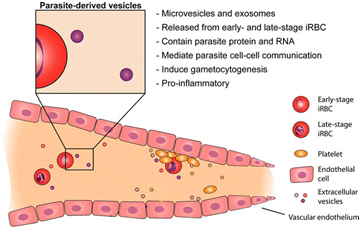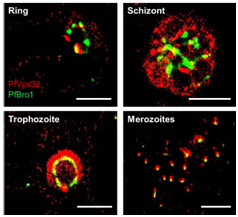Group: Nanomalaria
Group leader: Xavier Fernàndez Busquets (xfernandez@ibecbarcelona.eu)
Malaria is a life threatening disease caused by the protist parasite Plasmodium. Despite of the available drug treatments, malaria still represents a world health problem due to the occurrence of drug resistance. Therefore, new and alternative therapeutical approaches are required to eradicate this disease.
One of the key mechanisms involved in the establishment of Plasmodium infection is the transport of virulence proteins from the parasite to the cytoplasm of the red blood cell or to the extracellular space. Recently, our group has discovered that Plasmodium falciparum, the deadliest human malaria parasite species, possesses a minimal endosomal sorting complex required for transport (ESCRT) machinery involved in the production of extracellular vesicles, which mediate protein export during the intraerythrocytic life cycle of the parasite.
Taking advantage of the low amino acid sequence conservation between Plasmodium and human ESCRT proteins, the main goal of this PhD thesis will be to develop different strategies to specifically target and block the action of ESCRT proteins from the parasite. For this purpose, the student will use different approaches including aptamer-based inhibitors, monoclonal antibodies generation and proteolysis-targeting chimeric molecules (PROTACs). In addition, the project will combine the analysis of the mentioned therapeutical approaches both in cultured cells and in vivo systems such as C57BL/6J mice as a model.
Sampaio NG, Cheng L, Eriksson EM. (2017) The role of extracellular vesicles in malaria biology and pathogenesis. Malar J 16(1):245.



